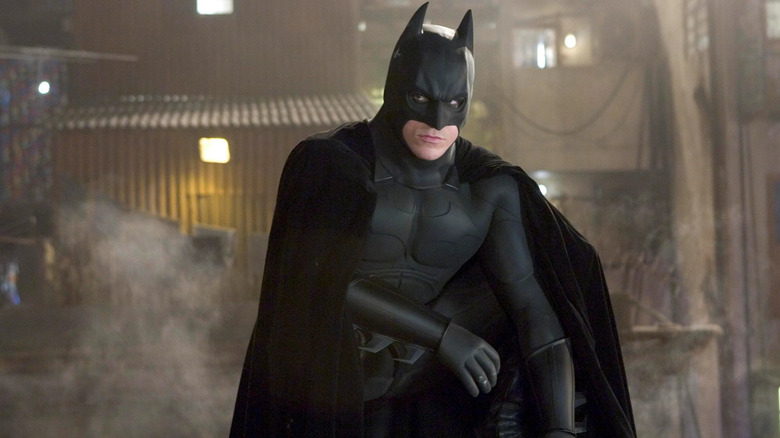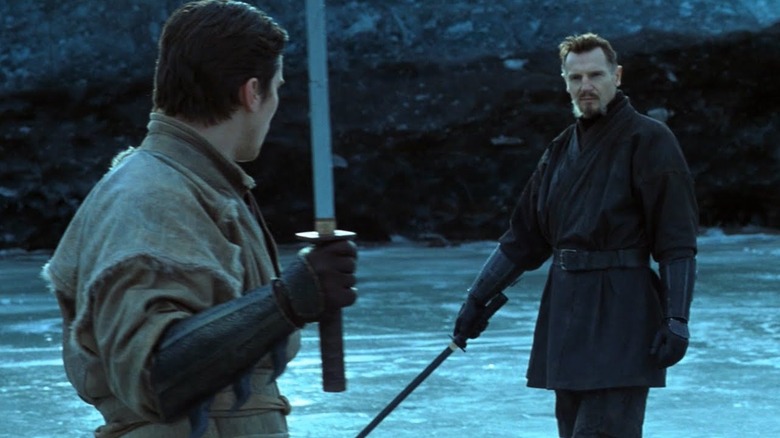Christopher Nolan Had To Follow One Condition To Direct Batman Begins
It is hard to believe that "Batman Begins" will be celebrating its 20th anniversary this year. That one fact alone immediately evokes the first chord of Hans Zimmer's "Time" from his "Inception" score in your head, as you are taken aback at how stupid fast the years fly by these days. No one can doubt how much impact Christopher Nolan's first entry in his "Batman" trilogy left on the comic book genre as we know it. And while the sequel, "The Dark Knight," was arguably more influential, that film would not exist without the origin story that set it up.
Before Christopher Nolan took over the reins on Gotham City, he was notable among cinephiles for his masterpiece, "Memento." The film's nonlinear storytelling and neo-noir thriller elements gave viewers a glimpse into Nolan's creative mind, giving him his first Academy Award nomination for his original screenplay. His next film, "Insomnia," was his first foray into studio filmmaking, establishing his long-running relationship with Warner Bros. Pictures, which lasted for nearly 20 years and came to an ugly conclusion after the studio's infamous decision to release their entire 2021 theatrical slate day-and-date with HBO Max.
Based on "Memento" and "Insomnia," one would look at Christopher Nolan as a filmmaker who specializes in R-rated dramatic thrillers. However, that did not stop him from signing on to direct "Batman Begins." Warner Bros. was looking to reboot the series following the infamous failure that was Joel Schumacher's "Batman and Robin," and while Nolan's previous films may not signify him as the typical director to adapt arguably the world's biggest superhero to the screen, he agreed to helm the project by accepting the studio's non-negotiable condition.
With Batman Begins, Christopher Nolan had to keep the film PG-13
Before Christopher Nolan took over "Batman Begins," Darren Aronofsky was tapped to direct the reboot, with a script he co-wrote with Frank Miller, reportedly adapting Miller's "Batman: Year One." Hiring Aronofsky signified that Warner Bros. was interested in a darker, more serious take on the character, given that Joel Schumacher's films were heavily criticized for their campy nature. However, Aronofsky and Miller's script was R-rated, and the studio wanted the four-quadrant PG-13 sweet spot.
Warner Bros. hired Christopher Nolan to direct "Batman Begins," which would be written by David S. Goyer, whose most notable screenwriting credits to that point were the "Blade" trilogy. Goyer discussed with the LA Times the studio's requirement that the film would be PG-13, which did not deter him and Nolan from crafting what was at that time, the darkest cinematic interpretation of the Caped Crusader to date:
"My view was that this is a movie I wanted to see when I was 11 years old, so in my mind it's always been PG-13. I never really addressed that issue specifically. I just assumed that's what it would be."
Christopher Nolan and David S. Goyer were allowed by Warner Bros. to commit to their darker vision with "Batman Begins," as long as the film would be marketed as a four-quadrant blockbuster. After years in development hell, "Batman Begins" soared into theaters in the summer of 2005.
Batman Begins was a significant step in the trajectory of Christopher Nolan's career
In many ways, "Batman Begins" was an inflection point for Christopher Nolan. The film marked his first collaboration with actors Christian Bale, Michael Caine, Gary Oldman, and Cillian Murphy – all of whom he would collaborate with on numerous films in and out of the streets of Gotham. After helming "The Prestige" (where he reunited with Bale and Caine), his one-two punch of directing "The Dark Knight" and "Inception" for Warner Bros. put him in the enviable position of having complete creative control over his films, which would only grow larger in scale in the years to come.
Perhaps the most fascinating aspect of Christopher Nolan's career trajectory since "Batman Begins" is casting Cillian Murphy as Dr. Jonathan Crane/Scarecrow. Murphy auditioned for the role of Bruce Wayne/Batman, and although Nolan chose Christian Bale, he still found Murphy compelling enough to play the film's primary antagonist. Murphy would reprise the role in the trilogy's subsequent films, and would also appear in "Inception," "Dunkirk," and, of course, "Oppenheimer." That film, which was a return to Nolan's R-rated roots, would serve as the ultimate culmination of his and Murphy's 20-year working relationship, grossing nearly a billion dollars, and giving the director and actor their first Academy Awards.
When an artist works within the Hollywood scene, much is often discussed about the "One for you, one for me" mentality, as Ryan Gosling's character Sebastian expressed in "La La Land." Although some may claim that Christopher Nolan's "Dark Knight" trilogy is symbolic of that approach, it is clear that he parlayed his work within the four-quadrant studio space into becoming arguably the industry's most powerful blockbuster filmmaker since Steven Spielberg, who fittingly presented him with his Best Director Oscar in 2024. Sure, "Memento" helped solidify Nolan as an exciting creative force, but the foundation he set up with "Batman Begins" eventually led to a blank check project like "The Odyssey."


